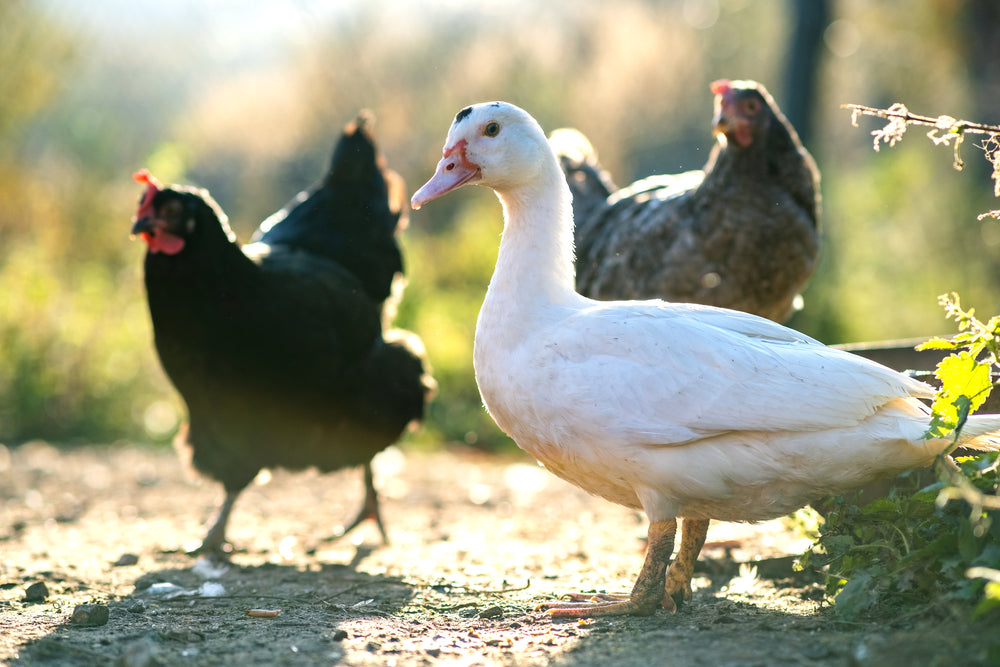
Ducks vs. Chickens - What's a better fit for my homestead?
Ducks and chickens are wonderful for hobby farms and homesteads. They don't require hundreds of acres of space, the shelter requirements are reasonably “doable," and it's a way for you to test the waters of livestock ownership without a large financial investment.

If you're just getting into the idea of keeping poultry, you're probably considering chickens (fresh eggs, pest management, fun chicken antics — what's not to like?). And maybe chickens are the best option for your homestead. Before buying a box of chirping yellow chicks, you might consider another popular option — ducks. Let's explore the pros and cons of the ducks vs. chickens debate and see which one might be the best fit for your homestead.
The Basics of Care Are Similar
No matter which species you choose, some basics are always required. These include access to fresh water 100% of the time, a daily feeding schedule (no exceptions!), and shelter in the form of a chicken coop or duck house (for inclement weather and nightly protection from predators). Naturally, you'll also be cleaning waterers, feeders and bedding.
Ducks: Some Considerations
They're hardy.
Generally speaking, domestic ducks are often healthier and more disease-resistant than chickens. They also have multiple layers of water-resistant feathers and extra fat storage that helps them stay warm in cold weather. It's not that chickens aren't hardy; ducks just tend to be hardier. If your region experiences harsh winters, you might consider ducks, though you can also find cold-hardy chicken breeds.
They're calm and quiet.
Chickens (especially roosters) can be a little loud, but ducks are notably quiet and docile. This might be beneficial if you have small children on your homestead. Ducks also largely ignore the famous pecking order of chickens, making introducing new members into the flock easier.
They love water — sometimes too much!
Ducks love water, and they especially love to play with water. This can be a lot of fun to watch, and it's part of what makes ducks so endearing, but this can also create extra work. While duck feeders and waterers are very helpful in controlling the mess, a natural or man-made pond helps ducks stay mentally healthy too. Maintenance of a pond is no small task, however, and neither is the daily cleaning of a plastic pool. In the winter, you might need to consider a pond de-icer.
Chickens: Some Considerations
They're super popular.
Everybody loves chickens! You'll easily find other enthusiasts who share your interest and can offer direct, first-hand help if you have beginner questions. A real-life mentor can be helpful when dealing with livestock, and you'll easily find other chicken keepers to lend advice.
They're better for small backyard settings.
Ducks are larger than chickens (and messier), so they generally need more room,1 as well as a water source to frolic in. So if space is at a premium or you're living in a suburban setting, chickens are probably the way to go.
They're easier to clean up after.
Even though chickens like to dig dust-bathing holes in the yard, they're overall tidier than ducks in the coop. Ducks love to splash water around on the duck house floor and have naturally higher water content in their waste, while chickens are comparatively cleaner. A simple chicken waterer and feeder system can control much of the mess. On the other hand, ducks generally do less damage to lawns.
Baby Brooders
You'll need a brooder system if you plan to raise chicks or ducklings “from scratch" (pun intended). While the basics of a chicken brooder or duck brooder are similar, you probably want to avoid raising the two species at the same time, as chicks and ducklings have different heating requirements as they age. A chicken warming pad can also help keep young chicks stay warm.
The Low-Down on Eggs
When it comes to fresh eggs right outside your door, many people immediately think of chickens. And there's good reason for this, as chickens indeed “rule the roost" when it comes to sheer worldwide egg production — in 2020, about 93% of the world's poultry eggs come from chickens, with ducks representing only 3% of the population.2
But some duck breeds can rival chickens in egg production year-round, with some duck and chicken breeds producing up to 300 eggs per year. Chicken eggs are ubiquitous, and it's hard to beat a fresh, just-laid-that-day chicken egg on the breakfast table. And there's plenty to love about chicken eggs from a nutritional standpoint. On the other hand, many people believe duck eggs have a richer, creamier texture. And with duck eggs being larger, there are some nutritional differences:3
| Egg Type | Calories | Protein | Cholesterol |
| Chicken | about 65 | about 6g | about 190mg |
| Duck | about 130 | about 9g | about 620mg |
Food allergies can also play a role in your decisions. Some people who suffer from an allergy to chicken eggs may be able to eat duck eggs safely. Conversely, a person with a duck egg allergy may be able to eat chicken eggs without issue. (Check with your health provider first!)
But keep an eye on that high cholesterol number when eating duck eggs. While the cholesterol found in eggs is generally considered to be healthier than, say, the cholesterol found in foods with trans fats, it's still a lot — well over the 300mg per day suggested by some health experts.4 That said, you can always use the egg whites, which lack cholesterol altogether but still provide other nutrients. Think of a single duck egg as nutritionally equal to about two chicken eggs.
Personal Preference
Finally, there's nothing wrong with letting your preference guide you. Maybe you simply prefer chickens or ducks! If you've always dreamed of having chickens, why not try them? And if you love the happy-go-lucky personality of ducks, maybe it's worth taking the steps to make them comfortable on your homestead.
Hopefully, you can now settle the great "chickens vs. ducks debate" for yourself. Both types of poultry have their merits and their drawbacks, but with careful thought and planning, you'll be able to choose the right bird for your homestead. Enjoy those eggs!
1. Metzer, John. Chicken Whisperer Magazine. "Chicken and Ducks — Together?" https://www.chickenwhisperermagazine.com/the-chicken-movement/chickens-and-ducks-together
2. Food and Agriculture Organization of the United Nations. “Poultry species." https://www.fao.org/poultry-production-products/production/poultry-species/en/
3. Johnson, Samantha, and Daniel Johnson. Hobby Farms. “A Veritable Variety: A Guide To Eggs Of 4 Poultry Species." Jul/Aug 2017. https://www.hobbyfarms.com/eggs-guide-quail-chicken-duck-goose/
4. Lopez-Jimenez, Francisco. Mayo Clinic. “Eggs: Are they good or bad for my cholesterol?" January 2022. https://www.mayoclinic.org/diseases-conditions/high-blood-cholesterol/expert-answers/cholesterol/faq-20058468


Leave a comment